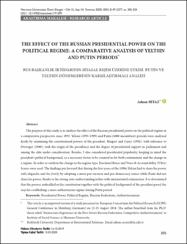| dc.contributor.author | Seyaz, Adnan | |
| dc.date.accessioned | 2021-12-12T16:49:52Z | |
| dc.date.available | 2021-12-12T16:49:52Z | |
| dc.date.issued | 2020 | |
| dc.identifier.issn | 1300-0845 | |
| dc.identifier.issn | 1300-0845 | |
| dc.identifier.uri | https://doi.org/10.14783/maruoneri.771599 | |
| dc.identifier.uri | https://app.trdizin.gov.tr/makale/TXprMk1qZzNOdz09 | |
| dc.identifier.uri | https://hdl.handle.net/20.500.11857/2132 | |
| dc.description.abstract | The purpose of this study is to analyze the effect of the Russian presidential power on the political regime in a comparative perspective since 1993. Yeltsin (1993-1999) and Putin (2000-incumbent) periods were analyzed firstly by examining the constitutional powers of the president. Shugart and Carey (1992), with reference to Duverger (1980), took the origin of the presidency and the degree of presidential support in parliament and among the elite under consideration. Besides, I also considered presidential popularity, keeping in mind the president’s political background, as a necessary factor to be counted in for both continuation and the change in a regime. In order to confirm the change in the regime type, Freedom House and Voice & Accountability (V&A) Scores were used. The findings put forward that during the first years of the 1990s Yeltsin had to share his power with oligarchs and the family by adopting a more pro-western and pro-democracy stance while Putin did not share his power, thanks to his strong state understanding in line with international conjuncture. It is determined that the powers embedded in the constitution together with the political background of the president paved the way for establishing a more authoritarian regime during Putin period. | en_US |
| dc.description.abstract | Bu çalışmanın amacı 1993 yılından bugüne Rus başkanlık iktidarının siyasal rejim üzerine olan etkisini karşılaştırmalı bir şekilde analiz etmektir. Yeltsin (1993-1999) ve Putin (2000-halen görevde) dönemleri öncelikle anayasada belirtilen başkanın yetkileri çerçevesinde analiz edilmiştir. Shugart ve Carey’in (1992) Duverger’e (1980) referansla önerdiği gibi başkanlık sisteminin ortaya çıkışı, parlamento ve elitler arasında başkanın sahip olduğu destek incelenmiştir. Yanı sıra, özellikle başkanın siyasal kariyeri ile birlikte değerlendirildiğinde önem kazanan başkanın kamuoyu desteği de rejimin devamlılığı çerçevesinde dikkate alınmıştır. Rejim tipindeki değişimi teyit etmek için Freedom House ve Vocie & Accountability (V&A) değerlerinden yararlanılmıştır. Bulgular göstermektedir ki özellikle 90’ların ilk yıllarında Yeltsin, Batı ve demokrasi yanlısı bir duruş benimseyerek iktidarı oligarklar ve aile ile paylaşmak zorunda kalmıştır. Putin ise uluslararası konjonktürden de yararlanarak güçlü devlet anlayışı çerçevesinde iktidarını paylaşmamıştır. Anayasada yer alan yetkiler başkanın siyasal kariyeri ile birlikte ele alındığında Putin döneminde daha otoriter bir rejim oluşumunu kolaylaştırdığı tespit edilmiştir. | en_US |
| dc.language.iso | eng | en_US |
| dc.relation.ispartof | ÖNERİ | en_US |
| dc.identifier.doi | 10.14783/maruoneri.771599 | |
| dc.rights | info:eu-repo/semantics/openAccess | en_US |
| dc.subject | [No Keywords] | en_US |
| dc.title | THE EFFECT OF THE RUSSIAN PRESIDENTIAL POWER ON THE POLITICAL REGIME: A COMPARATIVE ANALYSIS OF YELTSIN AND PUTIN PERIODS | en_US |
| dc.title.alternative | RUS BAŞKANLIK İKTİDARININ SİYASAL REJİM ÜZERİNE ETKİSİ: PUTİN VE YELTSİN DÖNEMLERİNİN KARŞILAŞTIRMALI ANALİZİ | en_US |
| dc.type | article | |
| dc.department | Fakülteler, İktisadi ve İdari Bilimler Fakültesi, Uluslararası İlişkiler Bölümü | |
| dc.identifier.volume | 15 | en_US |
| dc.identifier.startpage | 305 | en_US |
| dc.identifier.issue | 54 | en_US |
| dc.identifier.endpage | 324 | en_US |
| dc.relation.publicationcategory | Makale - Ulusal Hakemli Dergi - Kurum Öğretim Elemanı | en_US |
| dc.institutionauthor | Seyaz, Adnan | |



















